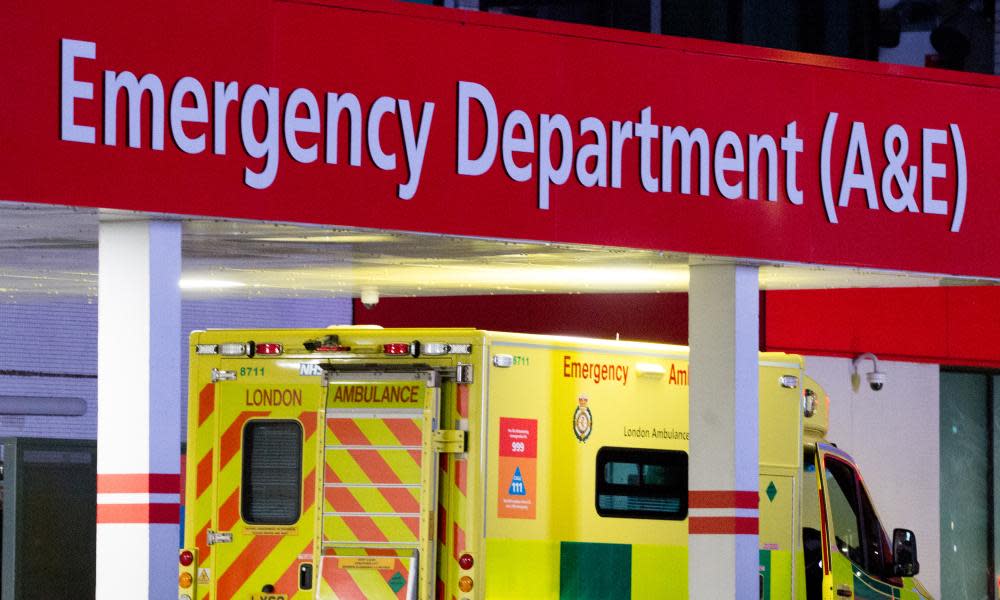Concern as heart attack and stroke patients delay seeking help

Further evidence is emerging of dramatic falls in numbers of hospital patients presenting with serious medical conditions such as strokes and heart attacks since the beginning of the coronavirus pandemic.
A US study found that interventions for serious heart attacks have fallen 38% since 1 March. Similar reductions were reported in Spain, while in Lombardy, the worst affected region of Italy, the figure was 70%.
On Wednesday the Guardian revealed that doctors and paramedics in the UK had warned of a sharp rise in the number of seriously ill people dying at home because they were reluctant to call for an ambulance.
Andrew Goddard, the president of the Royal College of Physicians, said: “Consultants in cardiology and emergency medicine are reporting significant reductions in admissions with heart attack symptoms.”
Something similar has been happening with stroke. The neurologist David Werring, who chairs the Association of British Neurologists’ stroke advisory group, said University College London hospitals NHS foundation trust, where he works, saw a 30% reduction in people being referred with stroke, or treated for stroke, compared with the same period last year.
“There is no reason to assume that the incidence of stroke declined since the onset of the Covid-19 crisis, but in many countries fewer people with symptoms suggestive of stroke present to the hospital,” stated the European Stroke Organisation last week, on publishing findings that 80% of stroke care providers across 55 countries were experiencing reduced demand.
“Patients are waiting longer to present with their symptoms,” said Goddard.
In mid-March, doctors at one Hong Kong hospital reported the average time patients waited before seeking medical care was around 320 minutes in the first months of this year, compared with around 80 minutes in the same period last year. While it is not yet clear what caused the drop, a popular theory was that people were staying away from hospital because they did not want to be an extra burden on the health service, or because they were afraid of catching Covid-19, or both.
“One possibility is that only the most serious cases are calling the emergency number, while the minor strokes and heart attacks are staying at home,” said Jean-Claude Baron, emeritus professor of stroke medicine at Cambridge University, who also works as a neurologist at the Sainte-Anne University hospital in Paris.
“If that is what is happening, it means we will see the same cases in a much worse state a few weeks from now. But that’s just a hypothesis, and studies are underway to investigate the issue.”
There are likely to be a number of contributing factors. Emergency numbers have been busier than usual lately, and some people may have had trouble getting through.
In some cases they may be seeking treatment in local hospitals or clinics, rather than going to centralised services.
Patrik Michel, a neurologist at the Centre Hospitalier Universitaire Vaudois in Lausanne, Switzerland, said that the constraints on indulging in strenuous exercise under lockdown may actually have spared a few people with ailing hearts from a heart attack – though this is unlikely to have had a major effect on numbers.
Werring said social distancing could similarly be protecting some of those at risk of stroke, because it means that they are less exposed to infections of all kinds. “There’s a strong association between infections and stroke,” he said.
Whatever is causing the lull, doctors are worried that a wave of more serious cases will hit the hospitals in the coming weeks and months, as those who did not present earlier with mild symptoms develop more serious ones. Transient ischaemic attacks or mini strokes significantly increase the risk of a major stroke, for example, and the earlier preventive treatment can take place, the better.
“The most important message to patients is that the NHS is very much open for business as usual for heart attacks and strokes,” said Goddard. “The risks of catching Covid-19 are small as the units managing such patients are very distinct from wards looking after Covid-19 patients. The risks of dying from heart diseases or being left with significant long-term effects are much greater.”
The pandemic has disrupted healthcare services across the board, in part because elective interventions have been postponed and outpatient clinics are being conducted remotely.
There have been reports of interruptions to childhood vaccination campaigns, and some women have been unable to get abortions within the legal timeframe. Lockdown may be creating its own health problems, too. The charity Alcohol Change UK reported a 355% increase in traffic to the help section of its website since 23 March – the day the lockdown was implemented in the UK.

 Yahoo News
Yahoo News 
